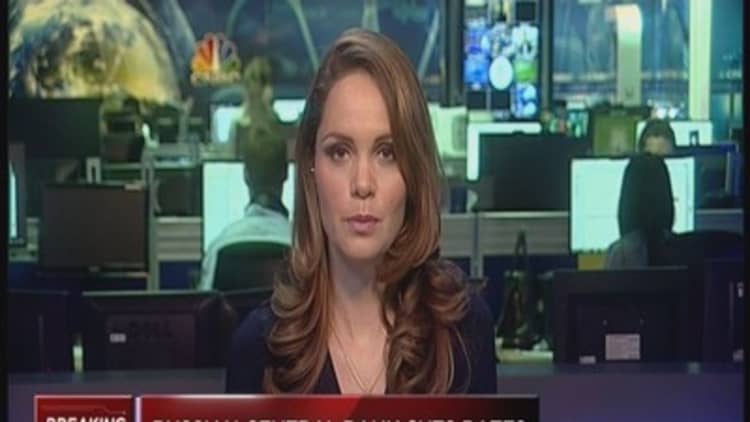
Russia's central bank cut its key interest rate by 50 basis points on Friday, amid signs of renewed weakness in the country's currency, the ruble.
The move by Russia's Central Bank (CBR) was as expected, according to a poll of analysts by Reuters, and eases the pace of cuts to its key interest rate. In a statement, the bank said it took the decision "taking into account that the balance of risks shifts towards the considerable economy cooling despite a slight increase in inflation risks."
The bank also forecast the Russian economy could weaken further.
"Major macroeconomic indicators demonstrate further economy cooling. The Bank of Russia estimates gross domestic product (GDP) decrease in the second quarter of 2015 compared with the similar quarter last year to be more significant than that in the first quarter of 2015."
"The economic situation in Russia will further depend on the dynamics of world energy prices and the economy's ability to adapt to external shocks," the bank added, forecasting that the probability of oil prices, on which Russia relies for much of its revenues, remaining below US$60 per barrel "for a long time" was now more likely.
The bank cut its key interest rate by one percent in June, to 11.5 percent, the fourth consecutive month of declines, but warned at the time that the pace of easing could slow. It said then in a statement that the scale of future rate cuts would depend on the rate of inflation.
Inflation in Russia currently stands at 15.3 percent in June although the rate is heading in the right direction.
The central bank is struggling because it wants to stimulate economic growth (the economy contracted 1.9 percent in the first quarter), spending and borrowing by lowering interest rates without exacerbating weakness in the ruble, which increases inflation, which in turn pressures Russian consumers. The CBR has a target of 4 percent inflation by 2017.
The current trend of central bank easing comes after the bank raised the key interest rate to 17 percent in December 2014 in an attempt to deal with runaway inflation brought about by the weakened ruble.
The currency has been on a roller-coaster ride over the last year, losing half of its value against the dollar as investors dumped the ruble after international sanctions were imposed on Russia for its role in the uprising in Ukraine, annexation of Crimea and lower oil prices.
Although the ruble recently recovered some of its strength against the dollar, trading below 50 rubles to the greenback in mid-May, it has since weakened again and on Friday was at a four-month low against the dollar. This week alone it has declined 3.5 percent against the dollar and on Friday, was trading at 60.3870 rubles to the dollar.
Alexander Branis, director of Russia-focused Prosperity Capital Management, told CNBC after the announcement Friday that it ongoing rate cutting was positive.
"I think it is fairly safe to assume by the year-end that they (the bank) will go down to something between 8 and 9 percent and of course, that's a long way from the 17 percent they imposed last year (in December) following the volatility in the second half of the year."
Branis said that inflation continued to trend downwards and in 12 months' time, he expected the rate to have fallen to 7 percent "because the effects of a declining exchange rate would be behind us by that time."
Earlier this week the central bank decided to suspend its daily purchases of foreign currency, a move showing the bank's concerns about the ruble's decline and currency volatility.
Contrary to other forecasts, Russia strategist at Nomura, Dmitri Petrov, told CNBC earlier on Friday that he believed the bank might keep rates on hold, given the uncertain inflation backdrop.
"The medium-term picture in terms of inflation is still quite favorable for them to use monetary policy which makes this meeting quite difficult, at the same time we've seen some inflation surprises in July with inflation expectations going higher…and that creates uncertainty about the inflation pattern," he told CNBC Europe's "Squawk Box."
"But the most important thing is the ruble, it has resumed its slide again and the primary factor for that is oil. The central bank can't control the impact of oil but it certainly doesn't want to add fuel to this sell-off at the moment, so we think this will trigger the decision to keep rates on hold at this point."
- By CNBC's Holly Ellyatt, follow her on Twitter @HollyEllyatt. Follow us on Twitter: @CNBCWorld


